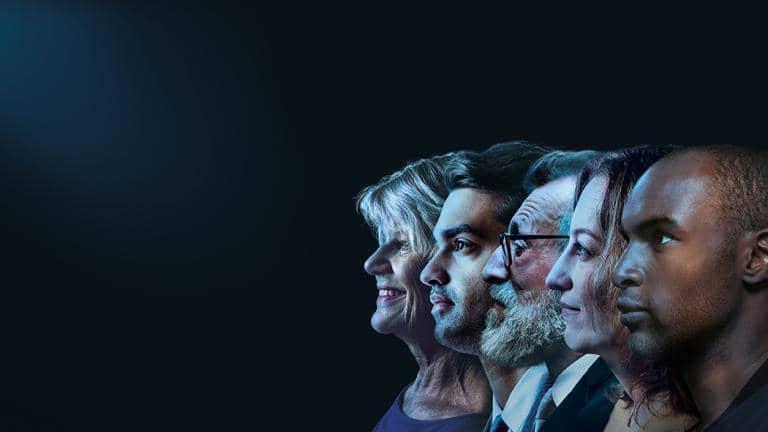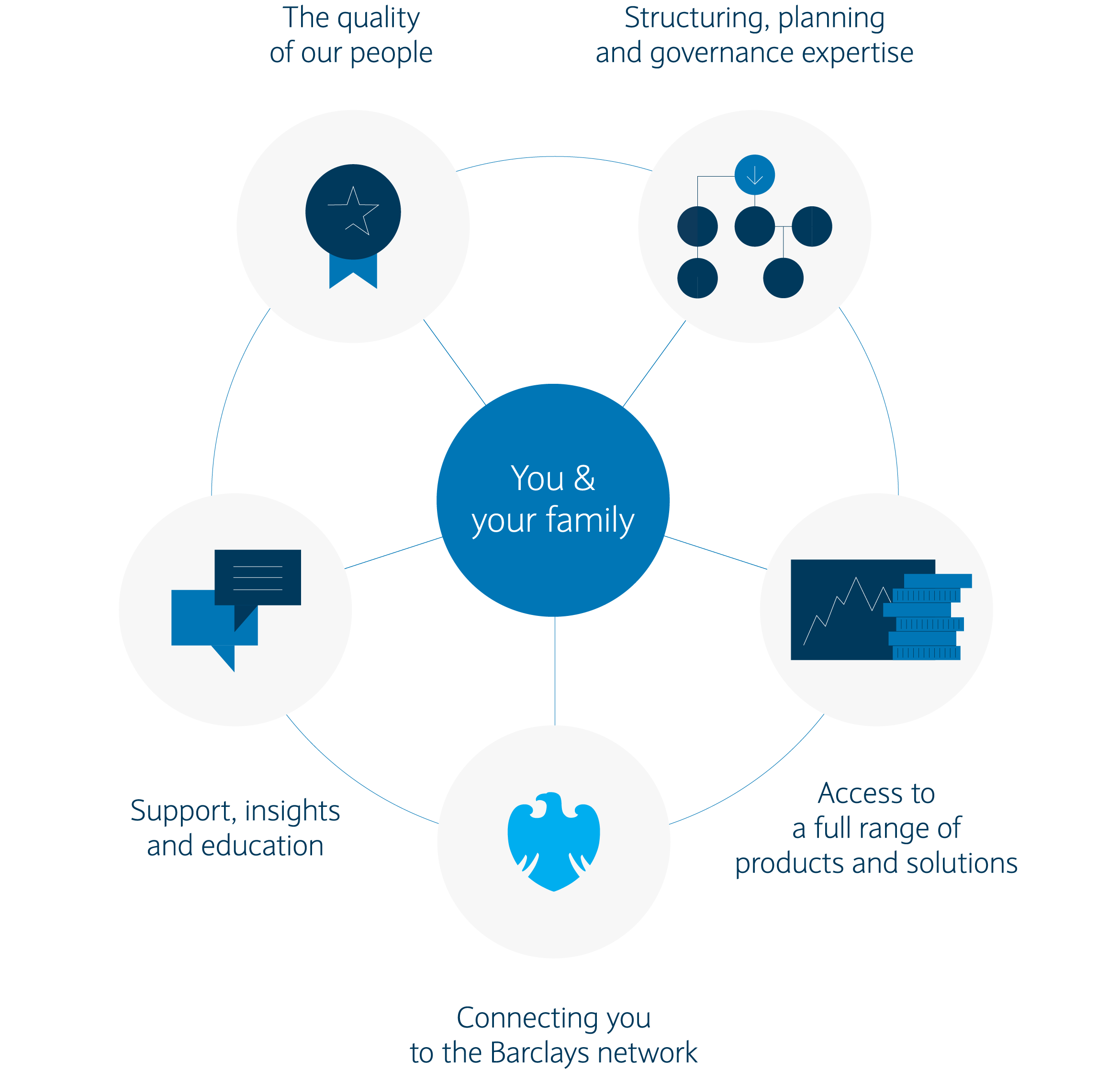
Smarter Succession
Discover our Smarter Succession content series which uncovers some of the tensions surrounding wealth and business transfer, and how to overcome them.

02 November 2020
8 minute read
There is no blueprint for succession planning. The business of family is personal, and there’s more to wealth transfer than simply passing on your assets. It’s a challenging experience for all involved, not just financially but also – crucially – emotionally.
“Wealth transfer has to be done on a family-by-family basis and there’s no magic bullet that will work for everyone,” says Mark Tucker, Global Head of Wealth Advisory at Barclays Private Bank. “There are common themes that run across many families and jurisdictions. They can learn a lot from each other.”
We commissioned leading intelligence agency, Savanta, to gain insight into the tensions and challenges often faced by global families when it comes to wealth and business transfer. Learn more about our research findings.
The following stories come from in-depth interviews with our clients. They show how different families are successfully navigating the process of passing on wealth and businesses to the next generation. Each story is different, but demonstrates a simple truth: by understanding the emotional and psychological issues at the heart of succession planning, these issues can be overcome.
It took me many years to understand how my father works
Azeem Merchant is CEO and Founder of Messung Global Connect, an automation company based in Pune, India. He discovered that good communication is the key to dealing with a strong-willed parent. Also, his overseas travels brought new perspectives to the family business.
“Always wanting to be involved” is how Azeem Merchant describes his father with fondness. Our research shows that wealth creators can often be overly controlling, with more than two-thirds saying they are cautious about handing over management of the family wealth1.
Azeem joined the family technology business in 2007 and worked across a number of roles before it was sold in 2012. He was closely involved in the sale and the family has since launched another business. He also runs the family office.
Azeem and his father have finally found a way to work together. According to Ashish Khanna, Director at Barclays Private Bank, who is banker to the client, the family office structure allows Azeem’s father to retain a measure of control but also ensures consensus. Initial investment discussions are held by Azeem together with an independent chartered accountant and the Chief Financial Officer (CFO) of the family’s business. They then forward proposals to Azeem’s father, and the four of them collectively take the final investment decision.
“Over a period of time this has led to better communication between father and son, who work on defined objectives set by the team,” says Khanna.
Our research shows that the younger generation tends to have a more global outlook than older generations, partly due to exposure to the internet, but also as a result of spending more time abroad. This can sometimes be a cause of conflict in families and lead to distrust among wealth creators1.
Happily this wasn’t the case for Azeem, who studied for his MBA at Cardiff University in Wales and believes his foreign education, rather than being a source of friction with his family, has been a positive factor. He says it has given him a different perspective compared to his India-educated peers and this gives him an edge. His time abroad has given him the confidence and connections to suggest new areas of investment and the ability to broker deals in new countries.
“Azeem often speaks of the levels of professionalism and teamwork he encountered abroad while studying,” says Khanna. “He’s put his learnings to use in both his business and wealth management decisions. The introduction of professional advisers into the family business is a direct result of what he learned overseas.”
However, Azeem says he has learnt the most just by working with his father. “I am blessed to have a good relationship with my father and my family, but it took me a long time to understand how my father works,” he says. “Sometimes, with sons and dads, they can’t be with and they can’t be without.”
I didn’t feel it was mine
Jan Rees is the founder of the Welland Trust and the Rees Foundation, two charities set up to help care leavers. She chose to transfer most of her wealth to philanthropic causes – but she has kept her family on board and involved.
According to our research, there are often trust issues for the originators of family wealth and businesses: more than half of them do not have confidence in the next generation to manage wealth or businesses properly1.
Jan believes her children lack what she calls the ‘merchant gene’ – that ability to know what a customer wants and then to provide it.
But there was another, far more persuasive reason why she decided to sell her business and invest the proceeds in setting up a charity, and it goes back to her childhood. That was when she first heard the story of her youngest uncle. Orphaned as a small child, he was separated from his siblings and dispatched to Canada under a forced migration scheme.
“I remember thinking, ‘That is not right. When I grow up, I’m going to have a great big house and fill it with all these children nobody wants,’” Jan says.
When she grew up, she did the next best thing and worked as a foster carer for many years and in 1994, together with her then partner, she set up a business to help hard-to-place children. They sold the company in 2019, and she walked away with £30m, although making money from the project had never been her aim. “It was a fluke,” she says. “We set out to look after children, not make money.”
So it seemed natural for her not to keep the proceeds for herself or her family. “I didn’t feel it was mine,” she says. She gave £200,000 to each of her children and used the bulk of the remaining money from the sale to establish The Welland Trust and Rees Foundation, both of which aim to help those who have previously been in care.
“A large proportion of Jan’s wealth has been used to set up these charities but it is a cause close to Jan’s heart,” says Ian Chesham, Senior Director of the Barclays Private Bank Charities team, who adds that it was a decision that might have caused considerable resentment among Jan’s children. “When you decide to give your wealth to charity rather than your children, it can be hugely divisive if you don’t get it right,” Chesham says. “You have to have a clear plan in your mind and have an open conversation, no matter how awkward that conversation might be.”
You have to have a clear plan in your mind and have an open conversation, no matter how awkward that conversation might be
Senior Director of the Charities team, Barclays Private Bank
In Jan’s case, her children have been totally accepting of her decision, especially as she never made a secret of what she intended. “They’d always known that most of the money was going to charity and there’s never been any disagreement about it,” she says.
Jan’s children are not involved in the running of the charity, but they’re supportive. However, in the next generation, although a ‘merchant gene’ has yet to show itself, her ‘caring gene’ is very much in evidence. One grandchild is a social worker, another has a degree in youth work and a third works with autistic adults.
All three are now trustees of the Welland Trust, and together with Jan they decide how funds should be distributed. Which suits Jan well, because she’s keen to keep the decision-making side of the Trust in the family. At some point, she will step back and so, “they’ll need more training on the financial side and hand-holding,” she says.
“That’s where we come in,” says Chesham, who looks after Jan’s personal wealth as well as the financial side of her charity, which he helped her set up. “Jan trusts that we will look after the charity, support her grandchildren and educate them,” he says. “We will give them bespoke training that fits their individual issues. We’ll start with a basic session on investing and build up from there.”
Jan has already given them her own kind of training. “I told them it’s like your own housekeeping money, but with a few more noughts on,” she laughs.
We want to ensure our children know the value of money and have the opportunity to make their own way in the world
Ian Baxter sold his business in 2011 and set up a new, fast-growing venture in 2014. He believes handing over wealth to his children gradually will help them master money, rather than letting it master them.
“I’m aware that money can be a slightly toxic topic,” says Ian, with classic British understatement. He and his wife, Helen, feel fortunate to have amassed their wealth and want to make sure it ends up being a blessing to their family, not a curse.
Ian believes that managed well, it has the power to put a turbocharger on the things they can achieve and the experiences they can enjoy. But if handled badly, Ian worries that their money could remove incentives and isolate them from the real world. And this philosophy particularly applies to the transfer of their wealth to their two children, who are in their early twenties.
“Like all decent parents, we want to help our children live the best possible lives based on our family’s values, which include self-reliance, hard work, life-long learning, helping others and holding our prosperity lightly,” Ian says. “But of course, there is a risk that handing over wealth to people who are just starting out in life could undermine all of that, denying them the self-esteem that can only come from their own achievements."
Ian believes that money that took years to build up shouldn’t be let go of easily, although he is keen not to be the kind of wealth creator identified in our research, who is unwilling to relinquish control. Entrepreneurs tend to be controlling by nature, so delegating wealth can be a worrying step into the unknown for some.
“Money should be something that can be passed down the generations and be used to create new businesses, build investment portfolios and enrich the lives of our family and those around us,” he says. “I certainly hope we have instilled good values in our children, but I don’t want to be overly domineering or the guy who has written obligations into their will to control people’s lives.”
“Ian and I had a discussion recently about him starting to help his children with their first managed investment portfolios,” says Marc Wright, UHNW and Family Offices Private Banker at Barclays Private Bank.
“He wants to do things gradually because he wants them to understand the importance and value of money and to learn about investing. If he said, ‘Here’s millions of pounds each, I want you to invest it,’ it might almost seem like Monopoly money. But if it’s a gradual thing, you get used to it, you understand it. Every time you do a good job managing what’s given, you get entrusted with more.”
Ian says that ever since he sold his business, his Barclays Private Bankers have often challenged him and his wife to address the question: what is their wealth for? It’s taken him some time, but he believes he has now reached a conclusion.
“I think the answer is to give Helen and me the freedom to live our best lives, to gradually endow our children and future grandchildren with the same opportunity and to give a decent chunk away to support charities we really care about, making a difference both in the UK and abroad,” he says. “When it comes to wealth transfer, we will do that step by step.”
He wants to do things gradually because he wants them to understand the importance and value of money
UHNW and Family Offices Private Banker, Barclays Private Bank
Succession planning is an emotional and highly personal subject, particularly when a family business is involved. That’s why we provide unique, practical insights that enable you to better understand and navigate challenging family dynamics. We also surround you with a team of Wealth Advisors who have a proven track record assisting clients with their complex multi-jurisdictional needs.
The quality of our people and stability of the team is what sets us apart. Our global network of specialists have over 250 years’ combined experience across a broad range of industry practices. Our Wealth Advisors are experts in their field with extensive knowledge across multiple international markets. They work alongside your current advisors, to help protect your wealth and support your planning, structuring and investment needs. We leverage our network to connect you to partners for requirements such as legal and tax advice
Underpinned by solid foundations across banking, credit and investments, our experts are on hand to support you with a variety of interests and ambitions.
Discover our Smarter Succession content series which uncovers some of the tensions surrounding wealth and business transfer, and how to overcome them.
We explore the challenges and opportunities global families face when it comes to intergenerational wealth transfer.
Find out how our experts can help to protect your wealth and support your succession planning, structuring and investment needs.
This communication:
Barclays does not and will not provide tax or legal advice. Any planning must be in line with our own internal tax principles. Please note that the tax treatment depends on your personal circumstances and may be subject to change in the future.
Where information in this communication has been obtained from third party sources, we believe those sources to be reliable but we do not guarantee the information’s accuracy and you should note that it may be incomplete or condensed.
Neither Barclays nor any of its directors, officers, employees, representatives or agents, accepts any liability whatsoever for any direct, indirect or consequential losses (in contract, tort or otherwise) arising from the use of this communication or its contents or reliance on the information contained herein, except to the extent this would be prohibited by law or regulation. Law or regulation in certain countries may restrict the manner of distribution of this communication and the availability of the products and services, and persons who come into possession of this publication are required to inform themselves of and observe such restrictions.
THIS COMMUNICATION IS PROVIDED FOR INFORMATION PURPOSES ONLY AND IS SUBJECT TO CHANGE. IT IS INDICATIVE ONLY AND IS NOT BINDING.
Smarter Succession: The Challenges and Opportunities of Intergenerational Wealth Transfer, October 2020, Barclays Private BankReturn to reference


